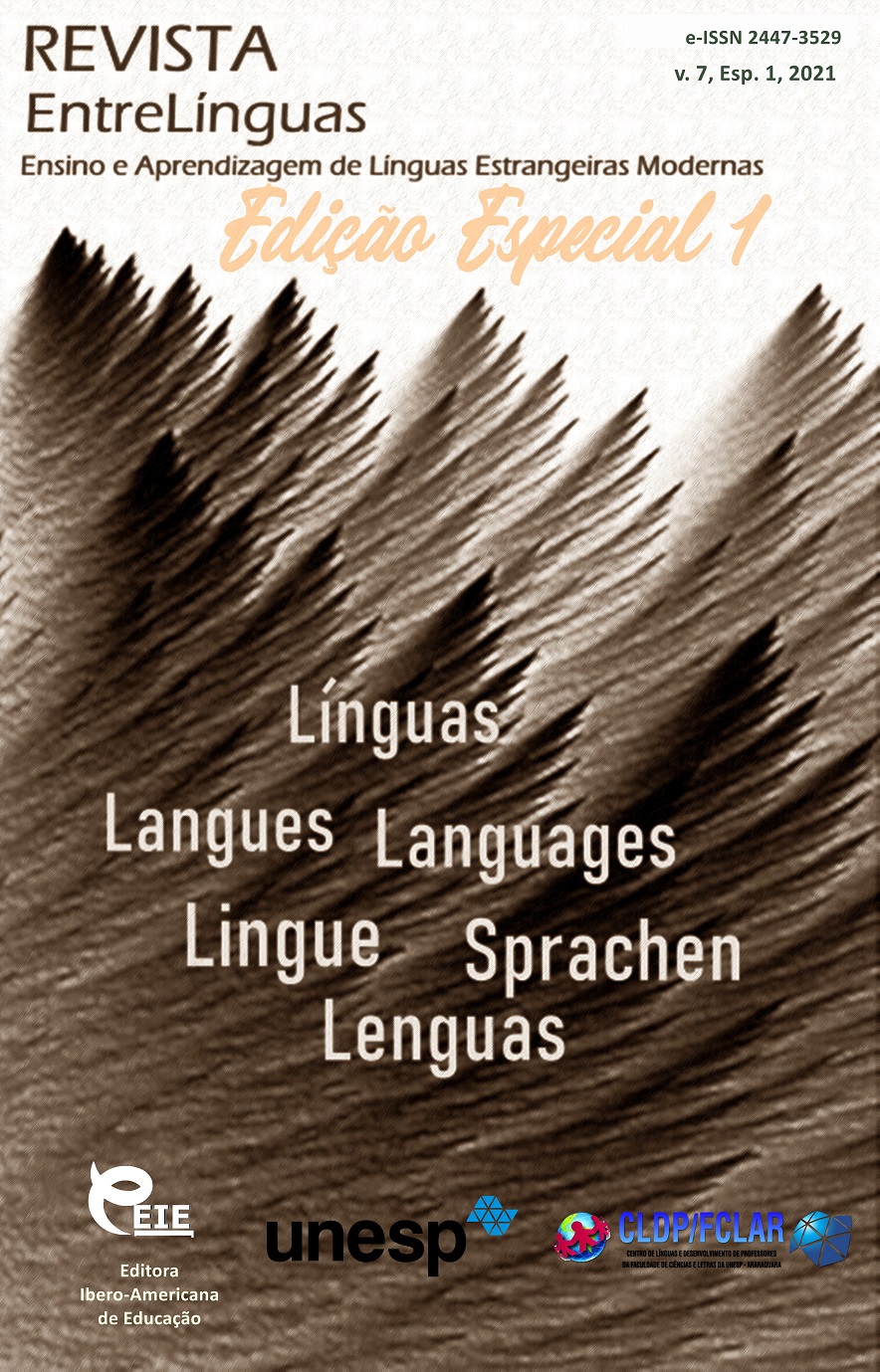Phraseological units as means of expressing the emotivity in the Tatar language
DOI:
https://doi.org/10.29051/el.v7iEsp1.14882Keywords:
Tatar language, Emotional vocabulary, Phraseological units, Culture, Ethno-psychologyAbstract
Systematization and description of the arsenal of linguistic means of expressing emotions represent one of the major tasks for linguistics that returns nowadays to the theory of Wilhelm von Humboldt, which in the early XIXth century appealed to study the language in close connection with individual speakers. A logical interest of the researchers to the processes of manifestation of emotions in the language has resulted in the formation of a new scientific field – linguistics of emotions aimed at the emotional environment of the language. In the Tatar language human emotions are verbalized mostly by the phraseological units representing various mental states of a person, one’s inner world. Studying means of expressing emotive vocabulary illustrated by the phraseological units provides an opportunity to present the whole complex of means of the language and the speech, as well as contribute to understanding the mentality and psychology of a Tatar language person. This article covers the Tatar phraseological units expressing negative connotation. The theme group “anger” represents the object of research. The authors have studied the emotional and appraisal semantics of the given group of phraseological units and attempted the revealing the specificity of the way of thinking and the worldview of the Tatar people. The analysis revealed that the phraseological units of the studied group are characterized by a great diversity of lexical, semantic, emotional and appraisal aspects. The emotional and appraisal volume of the phraseological units varies depending on the emotional state of the speaker and on his attitude to the addressee. Cultural and connotative semantics of the phraseological units is closely connected to the Tatar people’s worldview which has formed and has been enriched throughout the life experience.
Downloads
References
ABDRAKHMANOVA, A.; GALIULLINA, G.; KHADIEVA, G. Names of tatar brands as the reflection of national mentality. Turkish Online Journal of Design Art and Communication, v. 7, p. 1122-1127, 2017.
BAYRAMOVA, L. Happiness and unhappiness as value and anti-value in the phraseologic paradigm of russian, tatar, english, german, french: axiological phraseological dictionary. Kazan: Center of Innovative Technologies Publ., 2012. 495 p.
GABBASOVA, G. Means of Expressivity in the Tatar Literature Language (a case study of nouns and adjectives). 2002. 26 f. Thesis (PhD) – UFA, 2002.
GALIEVA, N. GALIULLINA, G. Emotive idioms Tatar language as national mentality reflection. Journal of Language and Literature, v. 6, n. 1, p. 273-276, 2015.
GALIULLINA, G.; YUSUPOVA, A.; KHADIEVA, G.; DENMUKHAMETOVA, E. Turko-tatar vocabulary as cognitive mapping of the national mentality. Kazan, 2001. 120 p.
GIZATULLINA, A. Emotive sentences with abriged syntax structure in tatar and french. 2001. 2019 f. Thesis (PhD) – Kazan Federal University, Kazan, 2001.
ISANBET, N. Phraseological dictionary of the tatar language. Kazan, 1989. v. 2, 222 p.
KUZMINA, K. H.; KHADIEVA, G.; GALIULLINA, G. The history of the development of literary tatar language in the 20th century (based on the example of the language of literary works). Journal of Research in Applied Linguistics, v. 10, p. 592-599, 2019.
SHCHERBININA, T.; DENMUKHAMETOVA, E.; DENMUKHAMETOV, R. Landscape components during phraseologism in the Tatar language. Journal of Language and Literature, v. 2, n. 7, p. 353-356, 2016.
VAKHITOVA, D. Invective Vocabulary of the tatar language: the functional and ethnomental aspects. 2013. 239 f. Thesis (PhD) – Kazan Federal University, Kazan, 2013.
YERBULATOVA, I.; KIRILLOVA, Z.; SAHIN, L. “National and Cultural Realias of Translations into Tatar. Humanities and Social .iences Reviews, v. 7, n. 6, p. 984-987, 2019.
ZAKIEV, M. Tatar lexicology. Kazan: Tahsi Publ, 2015. v. 1, 352 p.
ZAMALETDINOV, R. Tatar Linguoculturology: concepts of the mental world of a human. Kazan: Brig Publ., 2012. 300 p.
Downloads
Published
How to Cite
Issue
Section
License

This work is licensed under a Creative Commons Attribution-NonCommercial-ShareAlike 4.0 International License.
Os manuscritos aceitos e publicados são de propriedade da Revista EntreLínguas. Os artigos publicados e as referências citadas na Revista EntreLínguas são de inteira responsabilidade de seus autores.
Transferência de direitos autorais – autorização para publicação
Caso o artigo submetido seja aprovado para publicação, já fica acordado que o(s) autor(es) autoriza(m) a UNESP a reproduzi-lo e publicá-lo na EntreLínguas, entendendo-se os termos “reprodução” e “publicação” conforme definição respectivamente dos incisos VI e I do artigo 5° da Lei 9610/98. O artigo poderá ser acessado pela rede mundial de computadores (Internet), sendo permitidas, a título gratuito, a consulta e a reprodução de exemplar do artigo para uso próprio de quem a consulta, desde que haja a citação ao texto consultado. Essa autorização de publicação 328 EntreLínguas, Araraquara, v. 1, n .2, p. 323-328, jul./dez. 2015 não tem limitação de tempo, ficando a UNESP responsável pela manutenção da identificação do(s) autor(es) do artigo. Os artigos publicados e as referências citadas na Revista EntreLínguas são de inteira responsabilidade de seus autores.











